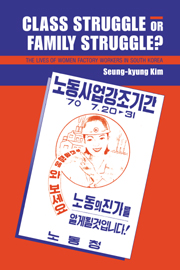Book contents
- Frontmatter
- Contents
- List of Tables and Figures
- Preface: Field, Subject, Author
- Acknowledgments
- Language Note
- 1 Women Caught between Global Capitalism and South Korean Patriarchy
- 2 The Process of Production in the Masan Free Export Zone
- 3 The Myth of Social Mobility: Its Creation and Reproduction among Women Workers
- 4 Labor Militancy and Collective Action
- 5 The Making of Working-Class Identity: Students' Theories and Workers' Lives
- 6 Conclusion
- References
- Index
6 - Conclusion
Published online by Cambridge University Press: 02 December 2009
- Frontmatter
- Contents
- List of Tables and Figures
- Preface: Field, Subject, Author
- Acknowledgments
- Language Note
- 1 Women Caught between Global Capitalism and South Korean Patriarchy
- 2 The Process of Production in the Masan Free Export Zone
- 3 The Myth of Social Mobility: Its Creation and Reproduction among Women Workers
- 4 Labor Militancy and Collective Action
- 5 The Making of Working-Class Identity: Students' Theories and Workers' Lives
- 6 Conclusion
- References
- Index
Summary
The period covered by my study of workers in Masan (1987 to 1994) was one of enormous importance to South Korea. Rapid economic growth was sustained, but the military dictatorship, with its antilabor policies, came to an end. The dominance of heavy and advanced-technology industries increased, while those light industries that employed women as production workers continued their relative decline. For women workers these changes have had complex and sometimes contradictory effects. The urban working class has continued to increase in number and has been able to engage in more open political activity. The end of military rule, however, fragmented opposition political forces and took away the sense of urgency that had driven middleclass college students into such activities as labor organizing. Furthermore, women workers have experienced a diminishing role within the working class as their jobs as production workers have decreased in number and become less important to the national economy. The female workforce in Masan is now only half of its size in 1987, although it is significantly better paid.
Nevertheless, much of what I found in Masan in 1987 remains unchanged. Factories are still the main employers, and young women still line up every morning outside the gates of the Zone. Women's jobs are still relatively low paid, with few prospects for advancement, and their work careers are still expected to be short, although more women are staying at work after marriage. Inflation has absorbed much of the wage increase and intensified saving for dowries has absorbed much of the rest, so factory workers still live poorly.
- Type
- Chapter
- Information
- Class Struggle or Family Struggle?The Lives of Women Factory Workers in South Korea, pp. 170 - 184Publisher: Cambridge University PressPrint publication year: 1997



